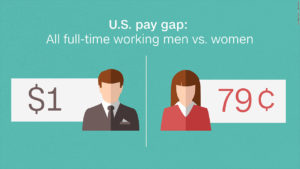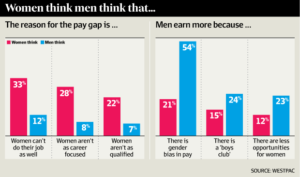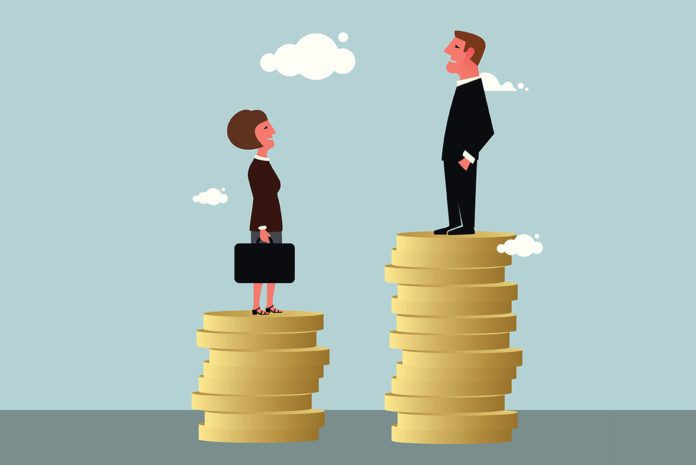Recent headlines on the issue of gender pay gaps include the country of Greenland in February of 2018 putting into public law that companies with 25 or more employees must pay men and women equally for the same job. During the same month, the BBC enacted pay cuts to several of its key male journalists over gender pay controversy. This was started when BBC China editor Carrie Gracie resigned her post in Beijing and returning to the BBC news desk in London so she can get a salary equal to her male counterparts while complaining very publicly about it.
Whenever someone uses the word “inequality” when referring to the pay gap between men and women, the emotional part of my brain nods slowly in agreement while the part with all the critical thinking and facts wants to roll my eyes so hard that I see the inside of my brain. Take my wife and I for example. We have similar backgrounds, went to the same university, graduated with the same MBA degree with concentrations in accounting, both started out working for the big accounting firms early in our careers, and have similar professional certifications. Despite this, my wife as a CPA with decades of experience working at corporations makes half what I do. It is entirely possible that some analyst somewhere is including us as statistics to prove a gender pay bias. Two people, almost identical beginnings, big difference in pay.
Gender pay gap according to US Census Bureau.

The question is then should my wife and I get paid the same? The answer is no. Our careers took different paths by personal choice. I took risks with my career in order to get experiences that allowed me to advance and thus achieve higher pay raises whereas my wife did not. It just isn’t her focus or interest. She prefers a steady job with good pay and benefits and isn’t looking to take on more responsibility or work than she has to. In our case, at the end of the day the money that we each make goes into the same pot anyways.
We all know the reason why certain jobs pay more than others and accept those differences. A doctor gets paid more than a fast food worker because of the level of education, experience and skills required to be a doctor is significantly higher than that of a restaurant worker. Certain high paying industries pay more than other industries due to shortage of qualified workers. Information technology roles such as programmers for instances gets paid substantially more than your average architect, even if the architect graduated from Harvard. Tech is also an industry that is dominated by men because historically more men go on to study science and technology in college than women. As there are fewer women in the tech industry, men of course get paid more on average as higher paid positions have a higher probability of being taken by men.
Another cause of differences in pay is age. The older one gets, the more money a person makes even if it is for doing the same job. Economist Thomas Sowell points out that most of the so-called studies on wealth inequality and income distributions fails to take age into account. As population groups age, they make more money and at the same time there are less of the same group each year as mortality reduces the group population. From a statistical perspective this spikes up the average wage earned to make it look like all the income is going to certain group within the population.
Another form of pay inequality exists based upon personal appearance. Companies in the fashion industry pay top dollar for certain models to be their spokesperson. There is a study that tall men with good hair gets paid significantly more on average than short, bald men. Other studies show that taller, attractive people get promoted and paid more than their shorter counterparts. There is an unconscious bias in many cases towards the more attractive people because that is how our brains are wired. So then is there a attractiveness wage gap such that the less attractive people should get paid the same as the attractive ones?
Below: Women think less about their own abilities as compared to men.

It seems clear that the data used to support the idea of inequality in wage is misleading at best and downright fraudulent at worst. As with any sort of statistics, data can be manipulated to say completely different things depending on what views the data analysis wants to push. Does pay bias exist? Sure, but for the most part the bias is favorable towards people who seek job advancement and against people who are just cruising along. Would you pay those two types of people the same? Not if you want people to make an effort.
Of course I want my wife and eventually my daughter when she joins the workforce to be paid fairly and equally for the work they do. But one logical fallacy is that employers pay women less simply because they can get away with it. If this was true, wouldn’t employers simply want to only hire women then to reduce their overall costs? Well, that is certainly not the case. It is my experience the women who get paid less were less vocal about negotiating their salary with their bosses or were not aggressive with making their career aspirations known and taking the effort to enhance their marketability.
The truth is, employers pay people differently based upon their potential for leadership and growth within the organization. It has been my experience that if a woman wanted to make more money by working hard and demonstrating they have what it takes to lead, they actually get preference over their male counterparts as their managers are looking to promote more females to make their internal quotas.























Jordan Peterson explains this topic very well, if you haven’t seen the you tube clip already.
https://youtu.be/aMcjxSThD54